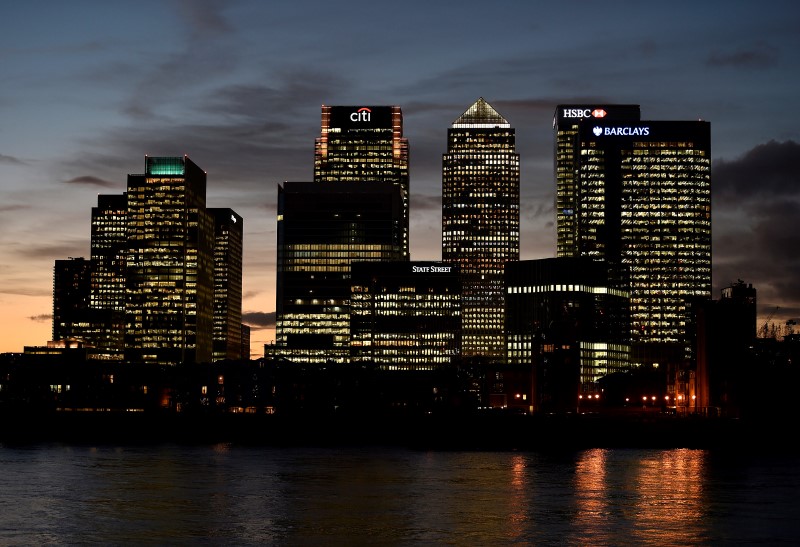By Sinead Cruise
LONDON (Reuters) - Shares in UK banks plunged on Monday as fears over the fallout from Britain's decision to leave the European Union sparked earnings downgrades and sell-offs by shell-shocked investors.
Shareholder anxiety about "Brexit" escalated despite calls for calm from British finance minister George Osborne following a weekend of political chaos in Britain and the euro zone.
Barclays (L:BARC), Lloyds Banking Group (L:LLOY) and Royal Bank of Scotland (RBS) (L:RBS) were among the hardest hit stocks, with falls of 15 percent, 8 percent and 16 percent respectively.
That helped push the STOXX Europe 600 bank index (SX7P) down to 120.2 points, less than 40 points off its August 1992 record low.
Barclays shares are now down 42 percent year to date, while RBS has shed 48 percent. The drop in state-controlled RBS has lost the UK Treasury around 8 billion pounds ($10.6 billion) in the last two market sessions.
Britain's Financial Conduct Authority, which reserves the right to intervene in disorderly markets, had no comment on the falls.
After lauding efforts by banks to cut costs and beef up balance sheets in recent months, a string of analysts said the likelihood of catatonic interest rates and falling credit demand after Brexit had put earnings prospects and dividend growth at risk.
"The market is justifiably concerned about the sustainability of earnings in a macroeconomically uncertain environment," RBC Capital said in a note that slashed its price targets for British banks by 30 percent.
European banks did not escape.
Barclays analysts downgraded earnings expectations for a slew of continental lenders including Bankia (MC:BKIA), Banco Populare (MI:BAPO), Intesa (MI:ISP), UBI (MI:UBI) and Unicredit (MI:CRDI), citing rising political risks and fading hopes for a lower cost of equity.
"The risks of anti-EU contagion, coupled with a number of binary events in the coming months - an Italian referendum in October, U.S., French and German elections beyond this - suggest it will be difficult for banks' costs of equity to fall anytime soon," the Barclays note said.
An Italian government source told Reuters the country was looking at options to protect its banks from a destabilizing share sell-off.
FRAYED NERVES
After double-digit stock price falls on Friday, investor nerves were frayed further by the resignation of EU Commissioner Jonathan Hill on Saturday - the man many hoped would renegotiate 'passporting' privileges that have turned British financial services into the country's most lucrative exports.
JPMorgan (N:JPM) used its note to highlight the mounting challenges faced by investment banks, cutting 2018 earnings per share estimates for the sector by 28 percent and rewriting recommendations for Morgan Stanley (N:MS), Goldman Sachs (N:GS), Deutsche Bank (DE:DBKGn), UBS (S:UBSG) and Credit Suisse (S:CSGN).
"European investment banks are to be avoided considering our inability to assess short-term counterparty, liquidity, and market-gapping risk, but also structural uncertainty such as the risk of losing EU passporting, which would lead to net additional staff and costs for investment banks," JPMorgan said.
JPMorgan estimated average 13 percent earnings per share cuts in both 2017 and 2018 for European banks, on the back of lower loan growth and expected increases in both bank funding costs and bad debt provisions.
The Wall Street heavyweight downgraded all domestic-focused UK lenders to neutral and underweight positions but joined rival analysts at Deutsche Bank in conferring preferred status on Asia-focused Standard Chartered (L:STAN) and Europe's largest bank HSBC (L:HSBA).
HSBC shares were trading down 2.1 percent at 1314 GMT, while Standard Chartered shares dropped 5.6 percent.
"Vindication of sorts is a good way to put it," said Hugh Young, head of equities at Aberdeen Asset Management (L:ADN), who has been forced to defend his firm's rationale for large exposures to both banks since China's economy slowed last year.
Shares in Britain's so-called challenger banks also dived.
Virgin Money (L:VM), Shawbrook (L:SHAW) and Aldermore Bank (L:ALD) lost between 26 and 16 percent.
Some investors said they felt the sell-off was overdone.
"Our exposure to financials is through commercial banks with strong local presence with self-help programs already in place to reduce the impact of the rates environment," said Bibiana Carretero, portfolio manager of the New Capital Dynamic European Equity Fund at EFG Asset Management.
"We are not selling these positions - we are actually focusing our efforts in quantifying the impact on earnings, credit risks and sustainability of dividend and we see current volatility more as an opportunity than as a threat."
Away from the stock markets, ballooning credit default swap (CDS) prices also showed wilting investor confidence in European banks' ability to ride out the fallout from Brexit.
CDS, which reflect the market appetite for insuring exposure to bank debt, showed the cost of insuring Barclays and RBS bonds against default rose almost a third between Thursday and Friday last week, according to June 24 data from Markit.

The Markit iTraxx Europe senior financials index soared to 128 points on June 24, up from 95 points a day earlier.